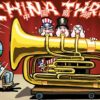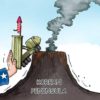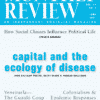
Legacies of Definancialization and Defending Real Economy in China
Confronting the triple trap of the COVID-19 pandemic, economic downturn, and ecological crisis, the Chinese leadership has reiterated that “China puts the people’s interests first—nothing is more precious than people’s lives.” This kind of people-centered governance philosophy is ostensibly meant to protect the lives and health of the people, while defending people’s property under the basic system of collective ownership. | more…

China: Imperialism or Semi-Periphery?
Whether China has become an imperialist country is a question of crucial importance for the global class struggle. Although China has developed an exploitative relationship with South Asia, Africa, and other raw material exporters, on the whole, China continues to transfer a greater amount of surplus value to the core countries in the capitalist world system than it receives from the periphery. China is thus best described as a semi-peripheral country in the capitalist world system. | more…

China and the American Lake
U.S. fantasies of expansion, commercial dominion, and military prowess have long hinged on a premise of Pacific exceptionalism. Couched in the millenarian language of manifest destiny, the Pacific region and its multitudinous ecosystems, cultures, peoples, and nations have been vacated in favor of an aqua nullius that frames the region as an empty space designated for U.S. possession by divine providence. | more…

In Line of Fire: The Korean Peninsula in U.S.-China Strategy
The war against fascism was transformed into the Cold War. U.S. imperialism, subdued somewhat by post-First World War isolationism, came into full flower. Washington implemented this sea change in many ways, including the division of the Korean Peninsula. | more…

The Political Economy of the U.S.-China Technology War
One of the key components of U.S.-China strategic competition is the technology war, the essence and implications of which can be further understood in the broader context of the international division of labor and the two countries’ internal contradictions. From this front, we can decipher the antagonism between different classes/groups within and across the two countries. | more…

Can the Chinese Diaspora Speak?
The Chinese diaspora is compelled either to prostrate to an edifying project of assimilation to U.S. liberal democracy, or be branded as illiberal “Red Guards” unfit for serious political discourse. This discursive context has long mobilized overseas Chinese to affirm the universalism of Western liberalism in opposition to a Chinese despotism defined either by dynastic backwardness or communist depravity. Can overseas Chinese speak for themselves in the face of the West’s “hegemonic right to knowledge?” Or will all such speech that challenges U.S. presuppositions of liberal selfhood and Chinese despotism simply be tuned out as illiberal noise? | more…

From Sandstorm and Smog to Sustainability and Justice: China’s Challenges
In China, the orientation toward “ecological civilization” has been proposed for some years. But if the hard core of developmentalism and modernization continues to be the guiding principle, China will continue to be challenged by social injustice and environmental devastation. | more…

June 2021 (Volume 73, Number 2)
Where capitalism itself is concerned, the dominant view is that the COVID-19 crisis constitutes a rare, unpredictable, and unlikely to be repeated occurrence. The world capitalist economy, we are informed, was fundamentally sound prior to the advent of this unforeseen exogenous shock, and it will revive quickly once the SARS-CoV-2 virus is under control. This received view, however, is incorrect on all counts. | more…

Capital and the Ecology of Disease
The death of Salvador Allende in 1973 marked, simultaneously, not only the demise of one of the great socialist experiments, and the launching of neoliberalism; it also represented the loss in Allende of one of the great figures in social medicine. Nowhere has neoliberalism had more devastating effects than in the destruction of public health and social medicine initiatives throughout the world. | more…

What Is Happening in the United States?
In order to understand what is happening in the United States, in the aftermath of the presidential election, one needs to comprehend the distribution of power in the country. | more…
The Guaidó Era
U.S. sanctions killed tens of thousands of Venezuelans before the recognition of Juan Guaidó as interim president in 2019 led to even more murderous sanctions. The message is that tremendous economic pain will be inflicted on the country until Nicolás Maduro is gone. | more…

Epidemic Response
The COVID-19 pandemic is at its root a crisis of globalization, racial capitalism, colonialism, the social organization of our public health system. It is a crisis of treatment and care versus demonization and wall building. And it is the latest pandemic in a long line of modern onesÑfrom SARS to swine flu to HIV to EbolaÑa predictable and predicted outcome, not the mysterious unforeseeable lightning strike as it is often portrayed. | more…

The Point Is to Change It
We who are engaged in the struggle for change might ask: “Through what lens of refraction is the evidence of events recalled and related?” If we are to resist the genocidal use of military force, and to oppose the environmental depredation that follows in its wake, we need to see the roots and laws of motion of colonialism and empire | more…